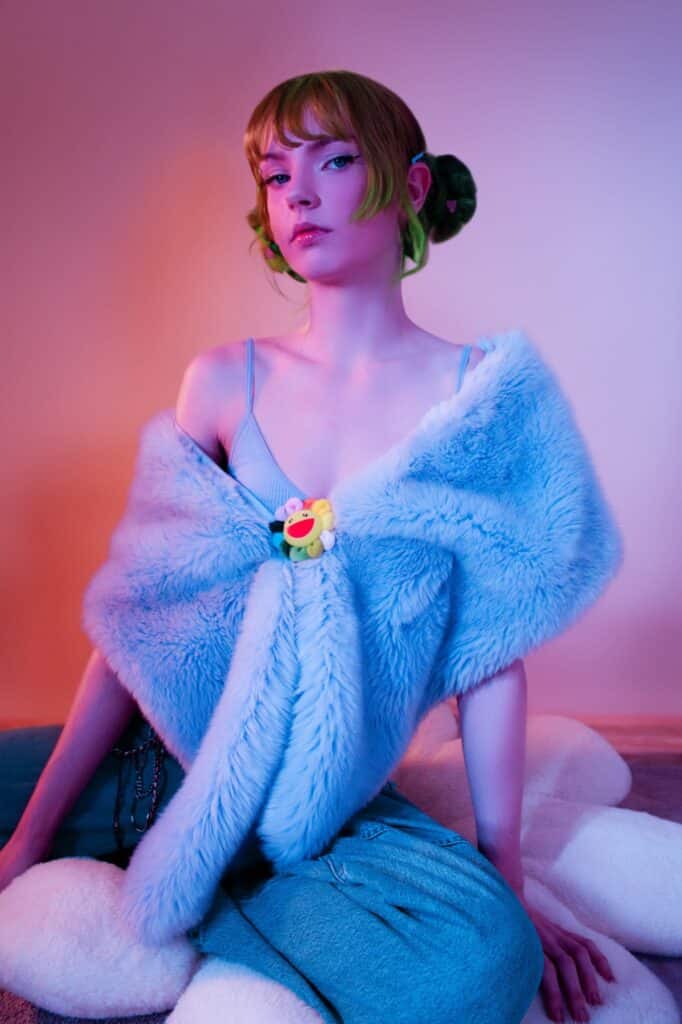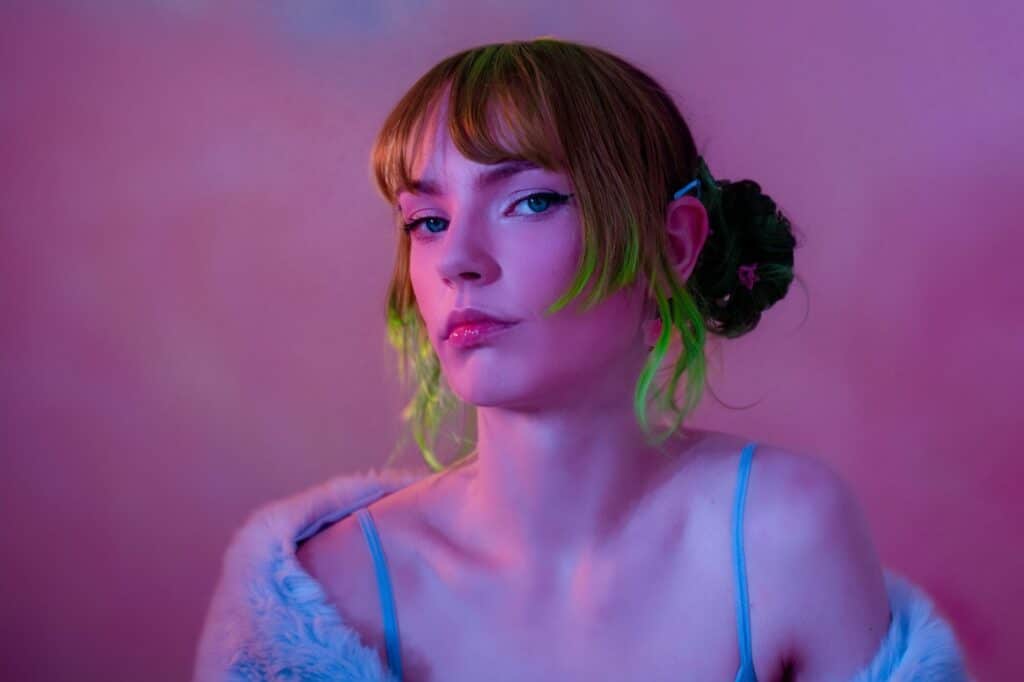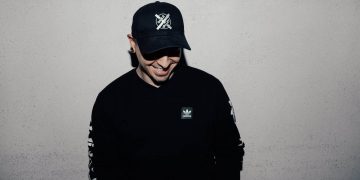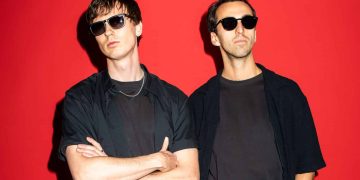Multi-talented artist ZOF swung by to chat about her earliest influences, the scene in Seattle, Nostalgic Premonitions, and so much more.
Although other cities in the US might be seen as hubs for dance music on a global scale, Seattle has continued to prove that there’s more than meets the eye. Nestled in the Pacific Northwest, this city has become a home for many artists in the scene who have put their creativity on full display, and ZOF is one rising through the ranks and turning heads along the way.
Over the years, ZOF found a home on an array of imprints in the house music realm, including Box Of Cats, Techne, Desert Hearts, and more, all while carving out a unique niche for herself in the scene. Add in some performances at festivals like EDC Las Vegas and curated nights hosted by Space Yacht, and it’s easy to see that she’s destined for greatness.
In 2023, ZOF took another creative step forward with her debut album, Nostalgic Premonitions. While her previous releases resided in the bass house and tech house realms, this collection of tunes saw her add her lyrical prowess and a touch of pop into the mix while putting the emotional roller coaster she’s ridden since before the pandemic on display. Each track is placed with intention, and as the story unfolds, there’s no doubt that you’ll feel a relatable tingle inside your soul.
As ZOF rides the wave of her fantastic album into the new year, she’s made it clear that there’s plenty more in store. But before the onset of 2024, we caught up with her to dive into her roots in the scene, the creation of Nostalgic Premonitions, and so much more for our final artist spotlight of the year. Stream her exclusive guest mix and read on for the full conversation!
Stream EDMID Guest Mix 402 || ZOF on SoundCloud:
Hi ZOF, thanks so much for taking the time to chat with us today before the end of the year. How are you holding up during the early days of winter?
I’ve been holding up well overall! The winter has been simultaneously incredibly chaotic and rejuvenating. I’ve been catching up with family and friends, old and new, spending a lot of time in the studio, and getting ready for 2024… how is it already 2024?!
Let’s dig into your early musical journey in becoming a multi-talented artist. Who were some of your earliest musical influences, and what drove you to pursue a career in electronic music specifically?
This is going to be long because I have a long music history… I’ve been passionate about music for as long as I can remember. As soon as I was talking, I was also singing constantly. My parents both have great and diverse musical tastes, so I grew up listening to a ton of cool music. A lot of 80s new wave, punk music, alt-rock, and pop music were in rotation in my early life. Things like Devo, Depeche Mode, Dead Kennedys, System of a Down, Rage Against The Machine, The Gorillaz, Cake, Duran Duran, The Cars, Talking Heads… I could go on and on, but that all comes to mind right away.
My elementary school gym teacher used to play Daft Punk’s Homework during free play time. I loved it so much that I asked her about it, and she burned the album on a CD for me. That was probably my earliest electronic music obsession, but I definitely pull a ton of inspiration from the music of the ’80s. The first CD I picked out for myself was No Doubt’s Tragic Kingdom album. I thought Gwen Stefani was just the coolest person alive.
In first grade, my parents bought me a Yamaha Keyboard for Christmas, which was a musical turning point for me early on. It had hundreds of songs programmed into it and a little screen that displayed all of the keys and fingerings, so I’d pick a song I liked, slow down the BPM, and copy it until I could play it myself. I was really dedicated, and it became an obsession. When I was playing Mozart, my parents were like, “Wow… we should probably get you actual piano lessons.” I continued lessons for most of my childhood and still play classical today. Chopin and Debussy are my favorites. Electronic music probably seems like a big conceptual jump from classical, but loops and variations are pillars of both.
I have always wanted to pursue music professionally since I was a little kid. I dreamt of being a concert classical pianist, but by high school, I started learning to play guitar and started writing little emo indie songs that I’d perform at my school’s open mic nights. It irked me that I’d get compared to Taylor Swift and not Phoebe Bridgers to give you an idea of what my style was. [Laughs] I also got exposed to a lot of electronic music at this time and started going to raves as often as I could.
The first “EDM” show I ever went to was a Pendulum live set, which had a gigantic impact on me. Seeing electronic music performed live like that was something I didn’t know was possible before, and it appealed to me because of my experience performing with instruments. I started listening to all kinds of electronic music like Crystal Castles, Crookers, Skream, Burial, Doctor P, Starkey, Flying Lotus, Rusko, Goldie, LCD Soundsystem, Four Tet, Scuba, Kaskade, Hot Chip… I literally could go on forever, but I’ll spare you—everything from electronica to dubstep to DnB to house. I know I’m biased because everyone is nostalgic about their high school music tastes, but I really feel this was a golden era of EDM for all sorts of subgenres.
For years, I went to all ages shows and illegal underground raves and just was a deranged little raver kid. I started going to festivals the moment I turned 18, and What The Festival (RIP) was particularly impactful. I discovered EPROM at the very first WTF, and that blew my fucking mind like nothing I’d ever heard before, and I also got introduced to Claude VonStroke’s wonderful world of Dirtybird. Nothing was the same after that.
I decided to make the jump from raver to DJ at a house party in 2013 when my friend showed me how to use CDJs. I DJed casually for years at friends’ parties and started taking it a bit more seriously in 2016 when I started DJing in clubs and learning to produce in Ableton. I released my first track in 2018, a collab called “Greed” on Desert Hearts, which I made with my friends EMUH and Chick Iverson. In 2020, I quit my job as a chemical analyst to have more time to make music, and then a few months later, COVID hit. During lockdowns, I realized if not now, when? And I decided to go all in on electronic music, and I’ve never looked back.

Over the years, you’ve graced some fantastic labels in the scene, from Box Of Cats and Space Yacht to House Of Hustle and Rock Bottom. Can you speak to your growth and how finding a home on these labels helped propel your creative journey?
For me, shopping music out to labels is always the worst part: lots of waiting, potential for rejection, and going through the boredom of reading and negotiating contracts. I’ve been really lucky, though, to have almost nothing but positive relationships with the labels I’ve released with. It’s incredibly validating when you send a demo, and the label is like, “This is sick. We want to sign it!” By the time I send something out, I already feel it’s good, but it’s always nice to have recognition from the tastemakers who run a label.
I rarely ever begin a track with a specific label in mind; usually, I’ll finish a track and try to consider where it might fit stylistically. I’m exceptionally grateful for the professional and personal relationships I’ve developed with the people at most of the labels I’ve released on. For example, I met WONGO from Box Of Cats back in 2018 when he was in Seattle for a show, and we became friends when I was still a baby producer and before I ever sent him tunes for the label. When I sent him the demos that became my Bubble EP, it was such a full-circle moment when he and Kyle Watson greenlighted the tracks. It felt like releasing with family.
This year brought your biggest project to life on Dome Of Doom, Nostalgic Premonitions. The layout of its tracks is very intentional. Can you speak to why you chose to approach it this way? And were the tracks all produced with that hourglass concept in mind?
The layout of the tracks on Nostalgic Premonitions was the last piece of the puzzle, actually. The first tracks I produced that ended up on the album were “WiFi” and “Let’s Be Friends,” I made the first versions of those in 2020. At the time, I was really just experimenting and trying to incorporate more of my singer/songwriter background into my productions. I had no idea what I would do with these songs because they were very different from everything I’d released at that point. They were way more personal and reflective of how I was feeling in that strange time period of constant change and uncertainty.
Around 2021, my current manager reached out to me, and I ended up showing him these songs, and he was absolutely blown away – I think I had about four songs that ended up on the album at that point. I tend to doubt myself (stupid imposter syndrome), and hearing feedback like that from someone who wasn’t yet super close to me was kind of a wake-up call that this music would be impactful and that I should find a way to release it. It felt like a bigger deal than just an EP or singles, so I started developing a whole album. I didn’t have labels in mind for it yet; I just was making what felt right and saving the tracks for when the time was right.
In 2022, Wylie from Dome Of Doom reached out to me on Twitter, asking me if I had music I’d like to release with the label. I shared the songs I had at that point with him, and he loved them. This honestly kind of surprised me since the album is so pop-driven, but we quickly made a plan to finish the full 12-track album ASAP.
Once all the songs were complete, I realized they all thematically danced around related topics, so the idea for the “hourglass” arrangement seemed natural. Writing lyrics is a way that I kind of translate and digest my subconscious thoughts, and I’ll often look back at the finished song and discover I’m kind of exposing feelings I hadn’t faced directly yet. I arranged the tracks in probably every way possible until I finally felt the order made sense both conceptually and sonically.
After spending years collecting songs and hundreds of hours perfecting them, I couldn’t just slap them together in any random order. Each song can be interpreted individually or as part of the whole, which I think is a huge part of creating a real album and not just a collection of tracks. I’ve always been an album person and like to listen to albums in their entirety from beginning to end, so I wanted to make sure that my album had that level of consideration and intentionality put into the order of the songs.
Conceptually, the progression of songs probably only really makes sense to me, so I also wanted the sonic progression of the album to make sense to any listener. This is why I started with “Same Thing,” which is much more poppy, and then moved towards the more club-friendly tracks like “Glitter” and “Psychosomatic” in the middle. I end the album with “Day One” because it’s a lot more upbeat and lighthearted than most of the rest of the tracks, and I wanted to leave people on a hopeful note because a lot of the songs lyrically are quite heavy.
You mentioned that each song is effectively a snapshot of what it feels like to be living during the end of the world or the beginning of a better one, and you’re hoping for the latter. How do you find optimism in the world when everything seems to be crashing down?
Well, first of all, I don’t always feel optimistic. I have always naturally tended towards cynicism and skepticism – it’s honestly probably one of my most annoying traits. I’ve been worried about big problems outside my control for as long as I can remember. I think most millennials can relate to that to an extent. I was doing a political science degree path when I first went to college and then switched to environmental chemistry, so basically, I know too much to always be optimistic.
Something I do to help not feel so hopeless is to take inventory of what I can control and what I can’t. This means taking breaks from reading the news and social media, focusing on self-care and friends and family, focusing on my goals as a musician and person in general, and consciously seeking out good news. Optimism is more about how you choose to perceive the world, so I choose to spend most of my mental energy focusing on what is good about the world and what I can contribute to improve it.
This isn’t to say that I check out completely and live in a fantasy world – I still stay informed and politically active to whatever degree I’m capable of and discuss the state of the world with people close to me. And I still spend a lot of time feeling sad and pessimistic. But it does mean that I often opt out of discussing contentious issues with strangers and on social media. I used to get into it online with people over social and political issues constantly, and it degraded my mental health severely with very little benefit. I’m not saying that political discourse online is pointless, but for me personally, it became so stressful that I had to step back from engaging with it in online formats.
I have found it way more beneficial to do my best to support what I see as forces for good in the world rather than constantly pushing back against what upsets me. From music industry politics to global issues, I try to find what I’d like to lift up instead of always focusing on what’s wrong. There’s so much wrong with the world, it’s easy to get so overwhelmed that you’re completely paralyzed by grief and stress when all you think about is war, climate change, and the rise of fascist and hateful mentalities. How can we expect anything to get better when we’re completely burnt out? All of that stuff is real, and it’s important to fight against it and publicly speak against it, but my main approach now is to fight it by connecting with people through art and compassionate discussions, ideally offline.
If you focus on the solutions to the problems and on what is going right, it’s a lot easier to maintain the sliver of optimism necessary to actually make those changes happen. I don’t know what the future will look like, but I think that there are enough good people in the world that we can hope for and work towards better times. Every generation has faced events that seemed world-ending, and we’re still here for now. It’s not over until it’s over.
Nostalgic Premonitions wasn’t just released digitally but on cassette as well. Why did you choose this media type for a physical copy instead of vinyl?
I initially wanted to do vinyl and cassette, but vinyl pressings are much more expensive. We may do a vinyl pressing in the future if there’s a lot of demand for it, but the tapes have been doing well, and Dome of Doom has done cassettes for most of their releases with a lot of success. I was excited to release on any kind of physical media, and tapes just made more sense for this first release.

One of the funniest things I saw you share was when you showed the students you tutor your music for the first time. What was that experience like, and do you feel like working outside of music helps keep you grounded or inspired?
Usually, I don’t tell my students about my music career because it can be distracting, and ultimately, my time with them is about them and their learning. But music came up in conversation with two students I’ve been working with since 2020, and I was honestly so nervous that they wouldn’t like it, but they thought it was awesome and have since told me they’ve listened to a bunch of my music. It’s cliche to say, but kids are the future, so if they think what I’m doing is cool, then I feel like I’m doing something right.
Working with kids definitely keeps me grounded and inspired, and they’re also a huge part of what keeps me optimistic for the future. The kids I work with are some of the coolest people I know, and they always surprise me with how smart and insightful they can be. To most of my students, I’m just a huge nerd who helps them understand math, and that’s kind of comforting in contrast to my public persona as an artist. It’s super rewarding when they express how much I’ve helped them, and I don’t think they realize how much they help me too.
The scene in the Pacific Northwest has similarities to other regions of the country, but it’s also unique in its own way. What’s your favorite aspect of the dance music community in Seattle? Is there anything you’d like to see change?
My favorite aspect of the Seattle dance music community is how tight-knit it is and how people here support each other, whether they’re brand new to the scene or have been working at it for years. Since the pandemic, the scene has suffered a lot with venue closures and stuff like many cities have, but people aren’t giving up and continue trying to push the music forward. But Seattle is kind of insulated from other dance scenes, and I’d like to see it expand and connect more with scenes outside of the NW. I think part of the issue is the techification that’s occurred here over the last decade and the city investing less and less in the arts and other programs that directly or indirectly nurture dance music culture.
This year has seen your career soar to even greater heights than before. Looking back on 2023, what’s been your favorite memory?
It’s difficult to pick one, but I think one of my favorite memories was getting to play EDC and go for the first time. I had never been able to afford to go to EDC and, for years, assumed I just never would. Getting to go, let alone to perform there, was absolutely surreal, and the festival itself was crazier than I’d ever imagined. One of my oldest friends was working at EDC building LED installations, and exploring the grounds with him was so cool. Imagine telling past us that in 10 years, we’d be chilling at EDC, where I was DJing, and he was building art installs – we would have never believed it!
Finally, what are some goals that you hope to achieve in 2024?
I’m hoping to make progress on a second album, play lots of festivals and shows in places I haven’t been yet, and I’d like to play internationally, particularly in Europe! My biggest goal is to get to a point where music completely supports me financially. I’ll probably continue tutoring, though, for as long as I can because I just enjoy doing that. Many of my students still have a few years to go before they graduate, and I can’t just leave them hanging. My most delusional goal is getting nominated for a GRAMMY, but that might be a two to five-year goal!
Follow ZOF:
Website | Facebook | Twitter | Instagram | SoundCloud








